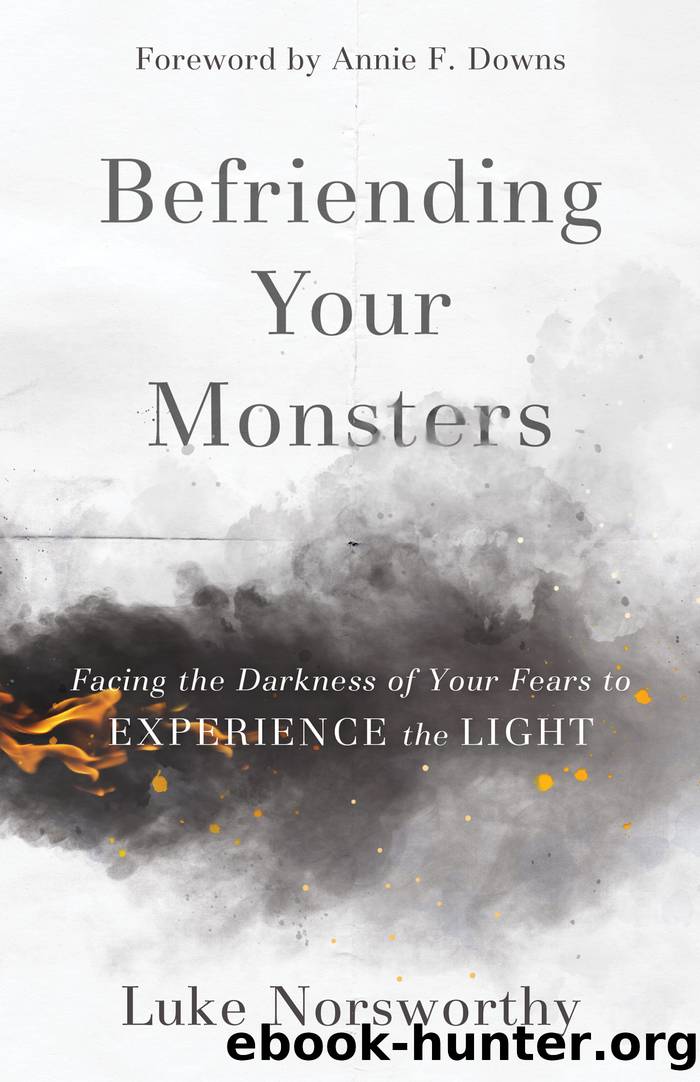Befriending Your Monsters by Luke Norsworthy

Author:Luke Norsworthy
Language: eng
Format: epub
Tags: Christian Living/Spiritual Growth;Fear—Religious aspects—Christianity;REL012120;REL012070
Publisher: Baker Publishing Group
Published: 2020-03-23T00:00:00+00:00
6.3 THE POINT
Never Full
JEPHTHAH
LET ME TELL YOU AN ATROCIOUS STORY from an atrocious section of Scripture known as the book of Judges. The larger narrative of the book of Judges shows Israelâs downward spiral as a nation, revealing Israelâs need of a new leadership structure. Judges lays the foundation for the implementation of Israelâs monarchy and their first king, Saul.
One of the predecessors of the kings, a military man named Jephthah, led the Israelites in battle against the Ammonites after promising God that if they win he will sacrifice whatever (or possibly âwhoeverâ as the Hebrew is unclear) the first thing is that greets him when he returns home. Given the typical design of an ancient courtyard with domesticated animals, Jephthah might have intended to offer livestock from his courtyard, but an animal was not what first greeted him.
A victorious Jephthah returns home to his only child coming out to meet him. She is dancing with timbrels, celebrating her victorious fatherâs return home.
Jephthah tears his clothes and weeps.
After he informs her of the situation, she accepts her fate but first asks for time to go into the wilderness to mourn her virginity for two months. After which she returned to her father, âwho did with her according to the vow he had made.â4
About this atrocious story, Fr. Ronald Rolheiser writes:
Thereâs a rather nasty patriarchal character to this story (such were the times) and, of course, we are right to abhor the very idea of human sacrifice. . . . What do death and virginity mean in this story?
Theyâre metaphors inside a parable meant to teach a profound truthânamely, all of us, no matter what age or state in life, must at some point mourn whatâs incomplete and not consummated in our lives. . . .
In the end, like her, we all die virgins, having lived incomplete lives, not having achieved the intimacy we craved, and having yearned to create a lot more things than we were able to birth. In this life, nobody gets the full symphony. Thereâs a place inside us where we all âbewail our virginity,â and this is true too of married people, just as it is of celibates. At some deep level on this side of eternity, we all sleep alone.5
Within everyone exists an incomplete and unconsummated facet of our soul because none of us get the âfull symphony.â Not because we canât acquire enough but because in this age we were never intended to be full. The cycle of attraction, acquisition, and adaptation futilely repeats itself, not because of a flaw in assessing our wants but because of an ignorance of the cracked human experience.
Jephthahâs daughter mourns her unfulfilled desire to be a mother. Some of us join her in mourning for a family that we desire but never receive. Some of us mourn the loss of our own victories outside the home that we never experience. But for every one of us, thereâs a part of life that doesnât ever become what weâve craved for it to be.
Download
This site does not store any files on its server. We only index and link to content provided by other sites. Please contact the content providers to delete copyright contents if any and email us, we'll remove relevant links or contents immediately.
The 5 Love Languages: The Secret to Love That Lasts by Gary Chapman(9815)
The Space Between by Michelle L. Teichman(6941)
Assassin’s Fate by Robin Hobb(6223)
Wiseguy by Nicholas Pileggi(5787)
Everything Happens for a Reason by Kate Bowler(4743)
Gerald's Game by Stephen King(4654)
Pillow Thoughts by Courtney Peppernell(4284)
A Simplified Life by Emily Ley(4163)
The Power of Positive Thinking by Norman Vincent Peale(4065)
Harry Potter and the Prisoner of Azkaban (Book 3) by J. K. Rowling(3360)
Resisting Happiness by Matthew Kelly(3341)
Girl, Wash Your Face by Rachel Hollis(3282)
Being Aware of Being Aware by Rupert Spira(3276)
The Secret Power of Speaking God's Word by Joyce Meyer(3220)
The Code Book by Simon Singh(3189)
More Language of Letting Go: 366 New Daily Meditations by Melody Beattie(3030)
Real Sex by Lauren F. Winner(3023)
Name Book, The: Over 10,000 Names--Their Meanings, Origins, and Spiritual Significance by Astoria Dorothy(2987)
The Holy Spirit by Billy Graham(2953)
